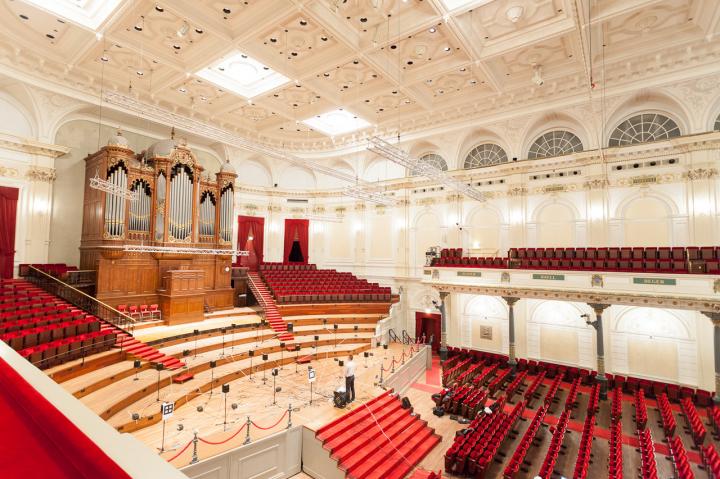Study shows music volume has a major impact on how the listener experiences the acoustics of a concert hall

Credit: Photo: Jukka Patynen
The volume and timbre of music have a significant impact on how people perceive the acoustics in a concert hall, according to two recent studies carried out by the research group of Aalto University Professor Tapio Lokki. Both have been published in the Journal of the Acoustical Society of America, one of the most prestigious journals in its field.
The first study demonstrated that, based on the music alone, it is difficult to distinguish which concert hall a piece of music is being played in. The test subjects listened to recordings of a single violin and of part of Beethoven’s Seventh Symphony, all played in four different concert halls: the rectangular Concertgebouw in Amsterdam and Herkulessaal in Munich, the vineyard-shaped Berlin Philharmonic, and the fan-shaped Cologne Philharmonic. They first heard a sample from the reference location, after which they tried to identify the reference location from four music samples.
It was easier to identify the hall when the same music sample played in each concert halls. If the reference sample was from a slightly different part of the same piece of music as used in the control locations, it was harder to identify the hall.
‘Even small differences in the music listened to made it very difficult to identify concert halls of similar size and architecture. Halls that were very different to each other were clearly more easily identified regardless of the music,’ explains postdoctoral researcher Antti Kuusinen.
Another study showed that the acoustics of a concert hall are experienced differently depending on the volume at which the orchestra is playing. The concert halls used in the study were the Helsinki’s Musiikkitalo, Munich Herkulessaal, Berlin Philharmonic and Berlin Konzerthaus.
The subjects listened to the orchestra playing at different volume levels, from the quietest piano pianoissimo to the strongest forte fortissimo, after which they placed the concert halls in order according to how loud and enveloping they experienced the music to be. The order of the concert halls changed in some cases related to the volume of the music.
‘Traditionally, the acoustics of concert halls are studied by using objective measurements to calculate acoustic parameters, such as reverberation time, which is independent of the characteristics or dynamics of the music. Our research clearly shows that this is insufficient for understanding the acoustics in its entirety, because both the timbre of the sound and the listeners’ perceptions shift as the volume changes,’ Lokki explains.
Lokki’s research group has also previously studied how the acoustics of concert halls affect the emotional reactions evoked by the music. The studies indicated that halls with acoustics that support large dynamic fluctuations evoke the strongest emotional experiences in listeners.
###
You can try identifying the acoustics of concert halls yourself here. Use headphones to take the test! https:/
Media Contact
Researcher Antti Kuusinen
[email protected]
Original Source
https:/
Related Journal Article
http://dx.




